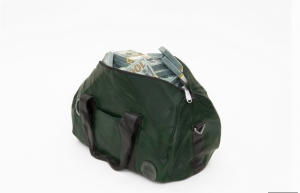 When Sharon Day decided to go on holiday two years ago to help her recuperate from a minor operation that went wrong and nearly killed her, the idea of sailing the seas with her family on board a luxurious cruise liner seemed the perfect answer.
When Sharon Day decided to go on holiday two years ago to help her recuperate from a minor operation that went wrong and nearly killed her, the idea of sailing the seas with her family on board a luxurious cruise liner seemed the perfect answer.
The Adventure of the Seas, a 138,000-tonne floating pleasure palace owned by Royal Caribbean Cruises, occupies its 3,100 passengers with attractions such as a nine-hole golf course, a climbing wall and even a wedding chapel.
What caught the attention of Mrs Day, a London lawyer and mother-of-three, were the art auctions held in the vessel’s public rooms by Park West Gallery, an American company which bills itself as the world’s biggest seller of art. It sells 300,000 paintings and prints each year, half of them on cruise ships (it holds sales on more than 80 vessels), and has annual revenues of $300m (£182m).
Among the items on offer to passengers entering Park West’s ocean liner auctions, where the sales patter of an expert auctioneer comes with complimentary champagne, are woodcuts by Rembrandt, Picasso lithographs and Salvador Dali prints.
Within a week, Mrs Day, 46, a long-standing art lover, and her husband Julian Howard, 48, a senior City lawyer, had spent nearly $98,000 (£60,000) and begun the $422,000 (£258,000) acquisition of a complete set of Dali’s Divine Comedy – six-volumes of prints originally commissioned by the Italian government in the 1950s to mark the 700th anniversary of Dante’s birth.
Park West’s auctioneer described it as a “masterpiece and a part of history”. What the couple did not know at the time was that their purchase would also be the departure point for a bitter transatlantic court case in which they, along with a number of other cruise-ship art buyers, claim in a legal summons they are victims of a carefully orchestrated fraud which has left them with pictures that are either valueless fakes, or genuine but commonly available works that are worth a fraction of their eye-watering sale price.
A journey intended to celebrate Sharon’s recovery from life-threatening damage to her intestines has become part of a legal tussle that goes to the heart of the global cruise industry – which is worth an estimated £30bn a year and makes a substantial proportion of its profits from selling goods on board its “shopping malls with lifeboats”. At stake is the reputation of the third-largest source of such revenues, namely the huge art trade conducted on the ocean waves.
Of the world’s nine largest and most lucrative cruise lines, all but one has a contract with Park West to sell art on board their ships.
The Fine Art Registry (FAR), an American art registration company that has set up a website publicising what it says is Park West’s penchant for sharp selling practices, insists that it has been approached by more than 200 former cruise-line passengers who believe they have been sold dud prints and pictures. (continued on The Independent)







